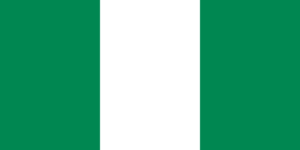Throughout history, a number of kingdoms and societies have developed in Nigeria. To the north were the Hausa kingdom and the Bornu Empire. To the south, Oyo’s kingdom of Yoruba flourished around 1400. Oyo expanded over the next several centuries to cover much of the southwestern region. In the 15th and 16th centuries, the Kingdom of Benin developed in south-central Nigeria.
| Capital | Abuja |
| Population | 223,804,632 (Source: 2023 worldometer) |
| Major Cities | Abuja (capital), Kano, Lagos, Port Harcourt, Calabar, Ibadan, Benin City, Owerri, Kaduna |
| Borders | the Republic of Benin to the west, Chad and Cameroon to the east, and Niger to the north |
| Gross Domestic Product (GDP) | $477,386,000,000(2022 worldometer) |
| Currency | naira (NGN) |

Nigeria Major Industries: crude oil, coal, tin, columbite; palm oil, peanuts, cotton, rubber, wood; hides and skins, textiles, cement and other construction materials, food products, footwear, chemicals, fertilizer, printing, ceramics, steel, small commercial ship construction and repair
Nigeria Agricultural Products: cocoa, peanuts, palm oil, corn, rice, sorghum, millet, cassava (tapioca), yams, rubber; cattle, sheep, goats, pigs; timber; fish
Nigeria Natural Resources: natural gas, petroleum, tin, iron ore, coal, limestone, niobium, lead, zinc, arable land
Nigeria Major Exports: petroleum and petroleum products 95%, cocoa, rubber
Nigeria Major Imports: machinery, chemicals, transport equipment, manufactured goods, food and live animals
Total Size of Nigeria: 923,768 km² (source: wikipedia)
Geographical Low Point of Nigeria: Atlantic Ocean 0 m
Geographical High Point of Nigeria: Chappal Waddi 2,419 m
Climate of Nigeria: varies; equatorial in south, tropical in center, arid in north
General Terrain of Nigeria: southern lowlands merge into central hills and plateaus; mountains in southeast, plains in north
World Region or Continent of Nigeria: Africa
Geographical Coordinates: 10 00 N, 8 00 E
Nigeria Government Type: federal republic
Nigeria Nationality: Nigerian(s)
Nigeria National Holiday: Independence Day (National Day), 1 October (1960)
Nigeria Independence: 1 October 1960 (from UK)
Nigeria National Symbol: eagle
Nigeria National Anthem or Song: Arise Oh Compatriots, Nigeria’s Call Obey
Nigeria Languages Spoken: English (official), Hausa, Yoruba, Igbo (Ibo), Fulani
Nigeria Religions: Muslim 50%, Christian 40%, indigenous beliefs 10%
Nigeria, with an estimated population of 174,507,539 in 2013, is the most populous black country and the seventh most populous country worldwide, after – at least most of – Pakistan, Brazil, Indonesia, the United States and the United States.
Nigerians make up one-fifth of the total black African population.
Nigeria, with 521 languages, ranks fourth in the world. This includes 510 living languages, the second two without native speakers, and 9 extinct languages.
The Portuguese arrived in Nigeria in 1472. In 1880, the British began to conquer southern Nigeria. The North was conquered in 1903.
Wole Soyinka is a Nigerian Nobel laureate. He writes “Phone conversation! »
Nigeria is a multi-ethnic country with more than 520 languages spoken. While English is the official language, Hausa, Yoruba and Igbo are also the main languages of the country.
Lagos, the former capital of Nigeria before it was moved to Abuja, is the largest and most populous city in the country and has been dubbed the “big apple of Africa”, a reference to New York City.
The country’s film industry, known as Nollywood, is one of the largest film producers in the world, second only to Bollywood in India.
Nigeria is home to Aliko Dangote, Africa’s richest man. Dangote’s business interests in agriculture, banking, cement, manufacturing, salt and sugar have earned him a net worth of more than $12 billion.
Thanks in large part to its export market, Nigeria is Africa’s largest economy. While the agricultural sector generates about 70% of jobs in the country, petroleum products are the main export, accounting for more than 90% of Nigeria’s exports.
Like in other African countries, some Nigerians consider the left hand unclean and its use a sign of disrespect. People who believe in this do not eat, shake hands or receive objects with their left hand.
Although there are a number of different religions practiced in Nigeria, the majority of the population is Christian or Muslim.

